A complete guide to typical Austrian food – 20 traditional dishes & desserts explains cuisine divided into vegetarian dishes, soups, meat dishes, sweets and typical drinks.
Austrian cuisine is a truly cosmopolitan combination of the culinary traditions from the national territory, and strong, enduring influences from the former Austro-Hungarian Empire countries, especially: Poland, Czech Republic, Slovakia, Hungary and north Italy.
Highlights of Austrian Cuisine
There are three outstanding elements of Austrian cuisine particularly worth noting:
- Exceptionally rich choice of game animal dishes
- Some of the world’s most delicious desserts (without any exaggeration!)
- The classy Viennese café culture
We describe all of them in the following sections.
Style of Austrian Restaurants
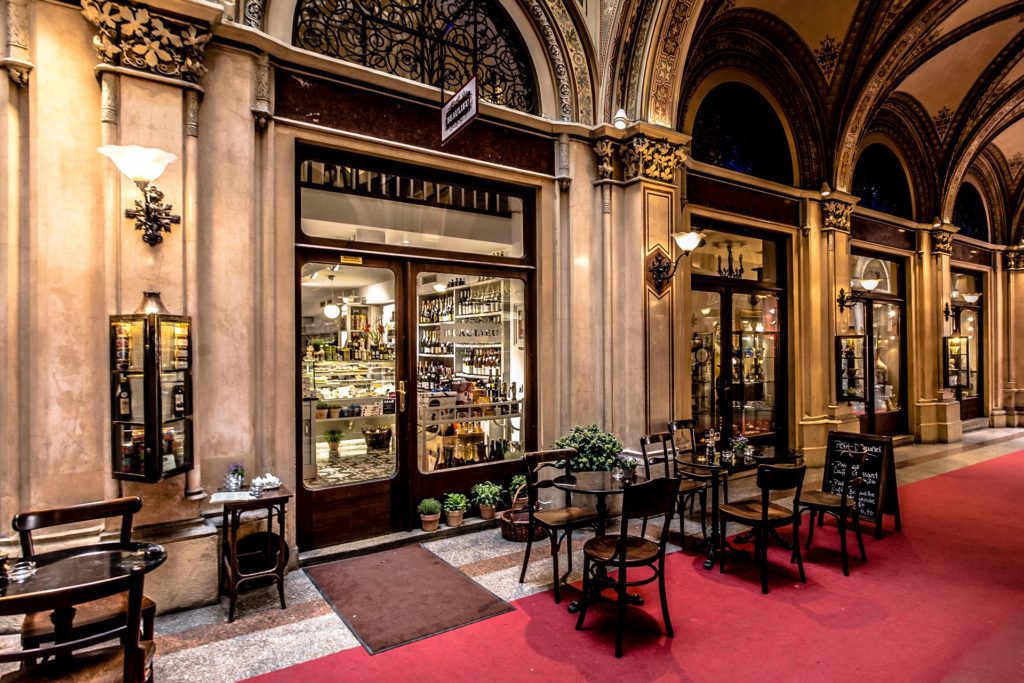
Austrian restaurants are stylish and inviting
One more thing makes eating in Austria special: the charmingly old-fashioned and very elegant service in majority of restaurants nationwide. Not only in Vienna, famous for its elegance, but even in small mountain villages in Austria I was impressed by impeccable manners of waiters and perfect hospitality.
Also on aestethic level, Austrian restaurants usually are stylish and pleasant to the eye. The gastronomy culture of Austria for centuries never ceases to impress. Elegant china coffee sets, great attention to details in the way the food and drinks are served and presented, somewhat ceremonial way of serving the guest – they all make the experience of eating in Austria exquisite and memorable.
List of contents
- Vegetarian Dishes
- Meat Dishes
- Desserts
- Drinks
1. Typical Austrian Food: Vegetarian Dishes
As the Austrian cuisine is very meaty, vegetarians who want to try something local and authentic, can mostly count on cheese dishes or sweet dishes. The portions are usually abundant and even sweet dishes are very filling, so you won’t be hungry. Dishes with cheese like Käsespätzle (#1.1. below) can be served with or without bacon, so always ask if a vegetarian version is possible.
In alternative, it shouldn’t be a problem to find vegetarian restaurants in Austrian cities.
1.1. Käsespätzle – Noodles with Cheese
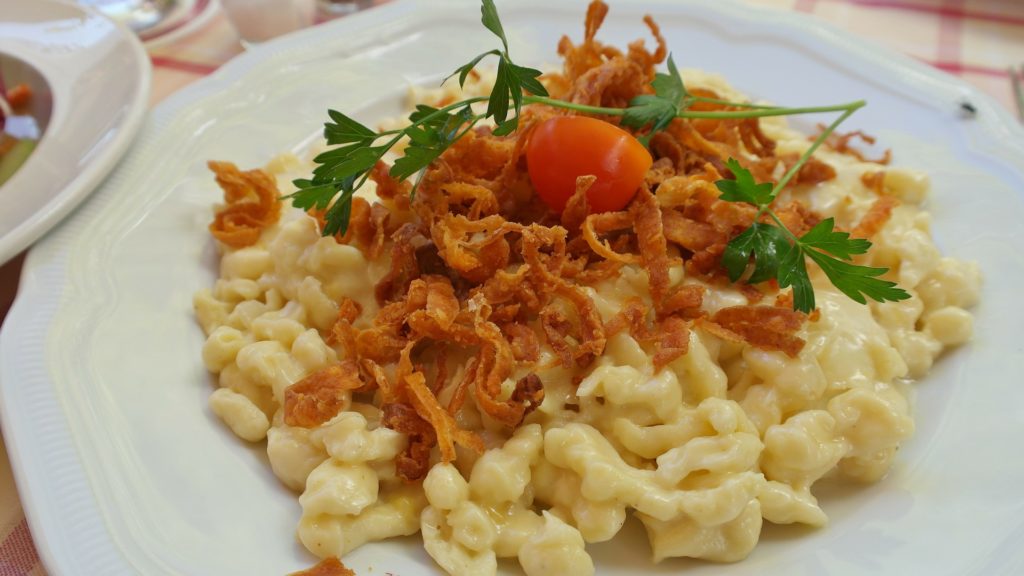
Käsespätzle
This dish, also typical for Germany and Switzerland, is based on very characteristic type of fresh egg pasta – Spätzle. It is cooked with abundant quantity of cheese and sprinkled with fried dried onions (and often bacon, so ask beforehand for a vegetarian version).
1.2. Kaiserschmarrn – Torn sweet pancakes
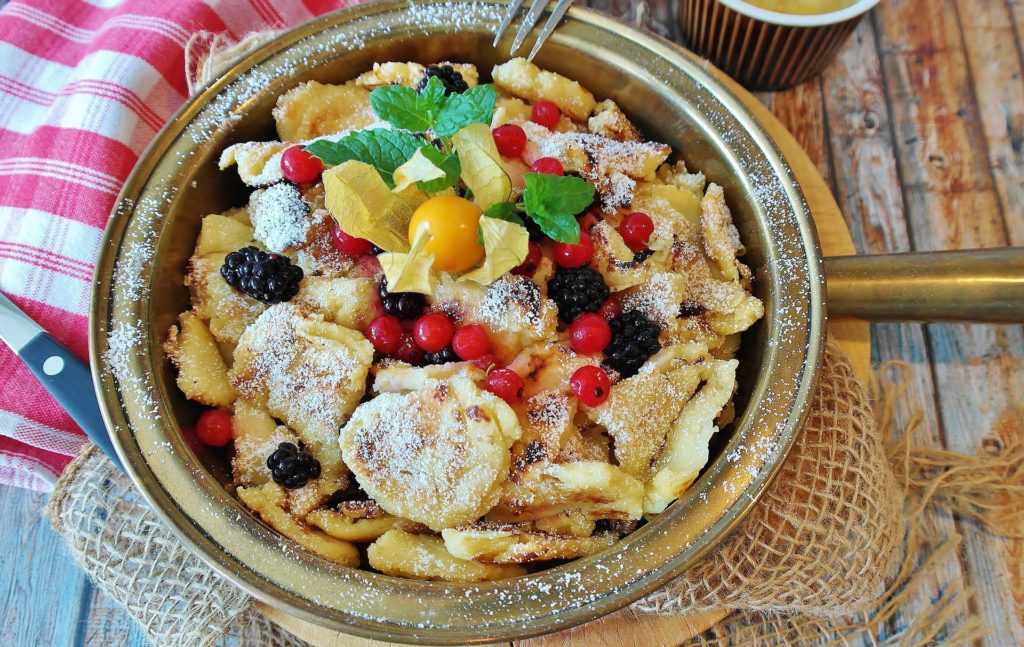
Kaiserschmarrn
This fantastic dish or dessert is made of big chunks of torn sweet fluffy pancakes. They are powdered with sugar, mixed with fruits, raisins etc. It’s an extremely tasty dish and the portion often is big enough to substitute a meal – or to share as a dessert.
1.3. Marillenknödeln – Apricot Dumplings
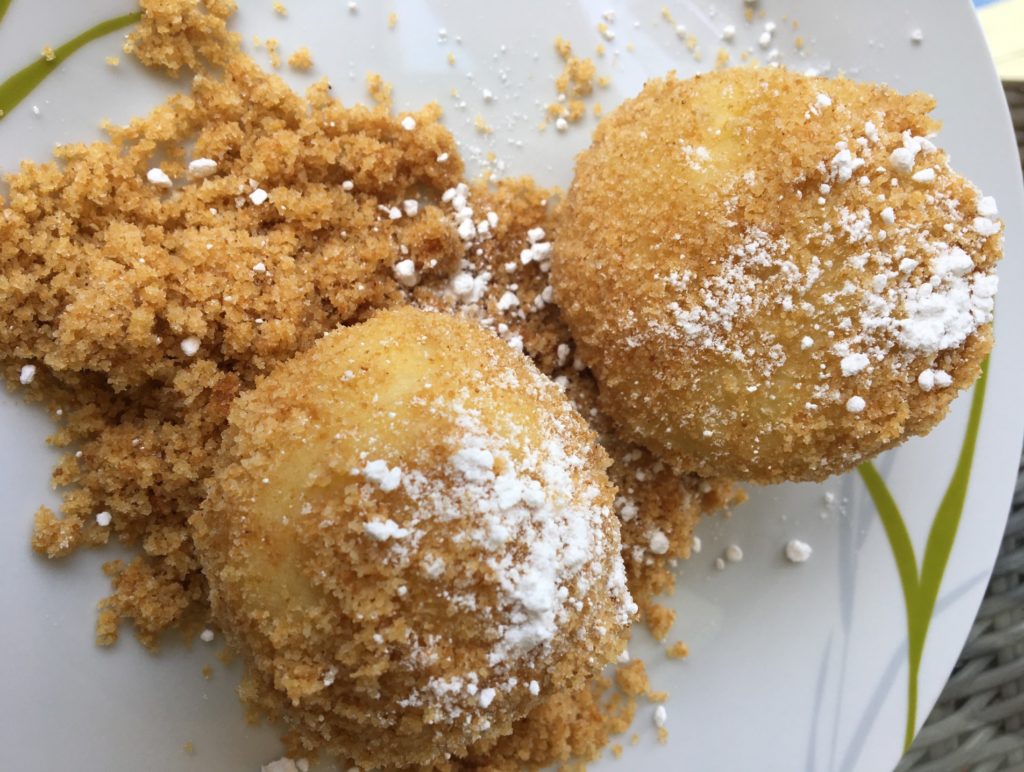
Marillenknödel
It is a sweet fruit dumpling stuffed with an entire apricot, powdered with streusel and sugar. The dough for the dumpling is prepared from potatoes or with fresh cottage cheese with flour and eggs.
1.4. Knödeln – Bread Dumplings
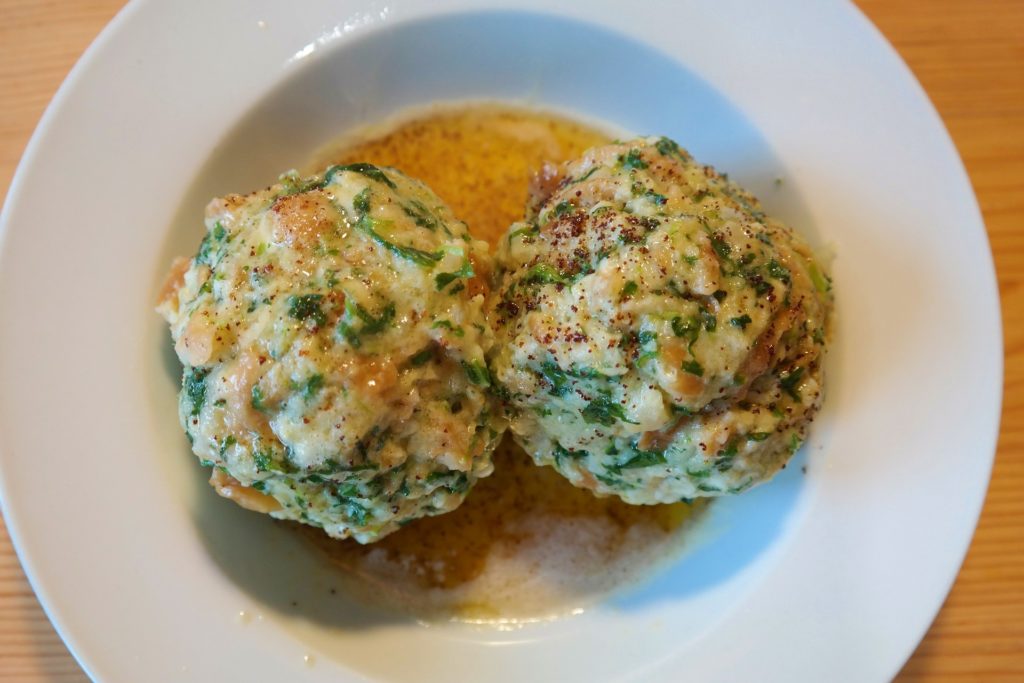
Typical Austrian and Central European Knödeln – Dumplings
This dish originally comes from Czech Republic, but it has been “domesticated” in the times of Austro-Hungarian Empire. There are different types of Knödeln, the most classic being Semmelknödeln – bread dumplings. These are tangerine-sized balls made of dry bread rolls mixed with eggs and milk, salt, parsley or fried onions. Knödeln usually just accompany meat dishes, but you can ask for having it served as a side dish with some vegetarian sauce, or to accompany a vegetable dish.
1.5. Kärntner Kasnudeln – Carinthia Noodles
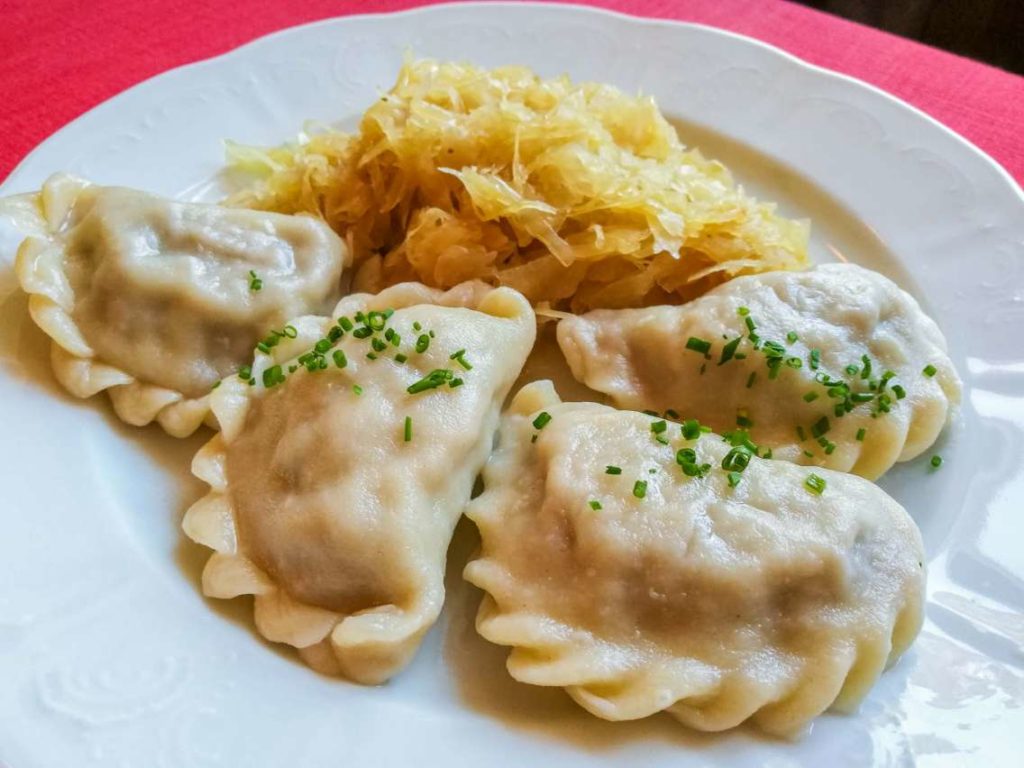
Kärntner Kasnudeln served in Gasthof Oberlercher in southern Austria
This dish, similar to national Polish dish – Pierogi, is typical for the region Carinthia in Austria. The dumplings have a delicate filling of fresh curdled cheese and mint leaves, usually served with melted butter and chiver or mint on the top.
2. Typical Austrian Food: Meat Dishes
2.1. Wiener Schnitzel – Viennese Cutlet
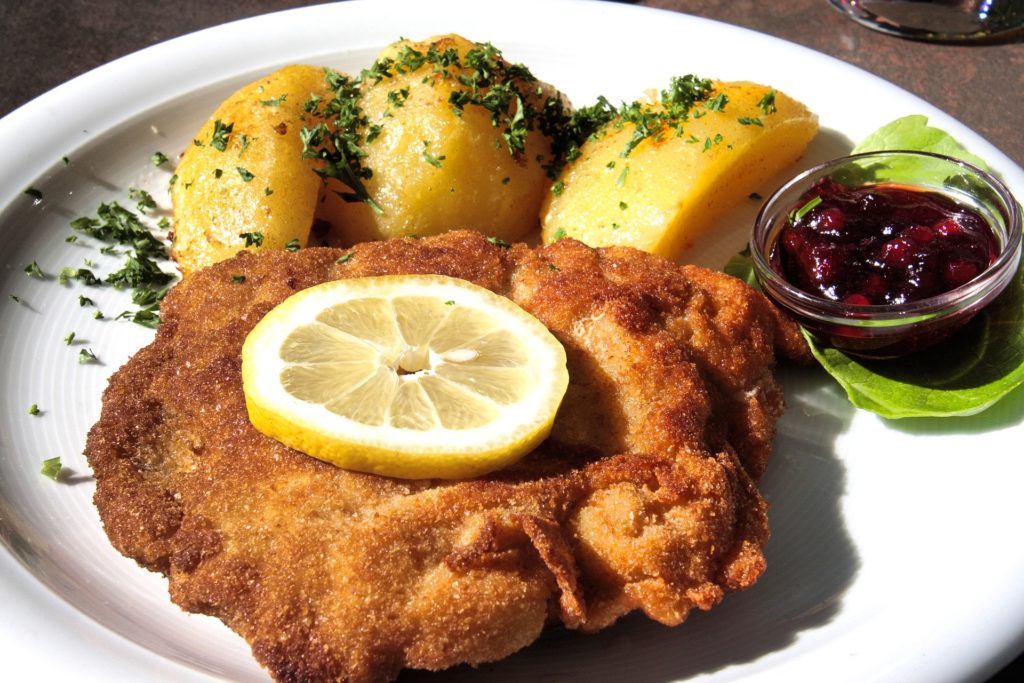
Wiener Schnitzel
By far the most typical Austrian dish – appreciated and known internationally – is Wiener Schnitzel. It is a thin slice of meat – traditionally veal – breaded with egg, flour and bread crumbs – and deep fried until it gains a golden colour. It is served with a slice of lemon and fresh parsley, and usually accompanied by potatoes or Semmelknödel – typical bread dumplings.
2.2. Tafelspitz – Beef Boiled in Broth
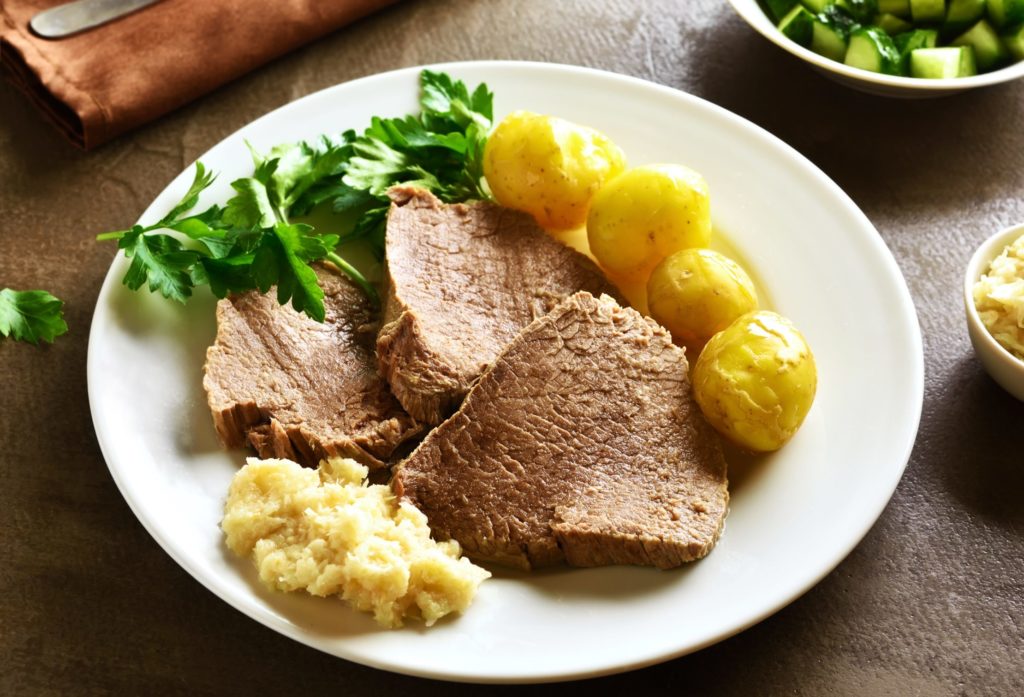
Traditional Austrian food – Tafelspitz – Beef boiled in broth
This very typical Austrian food is made of sliced beef boiled in broth, usually served with a special sauce of apple mixed with horseradish and sometimes chives.
2.3. Rindsuppe – Beef Soup
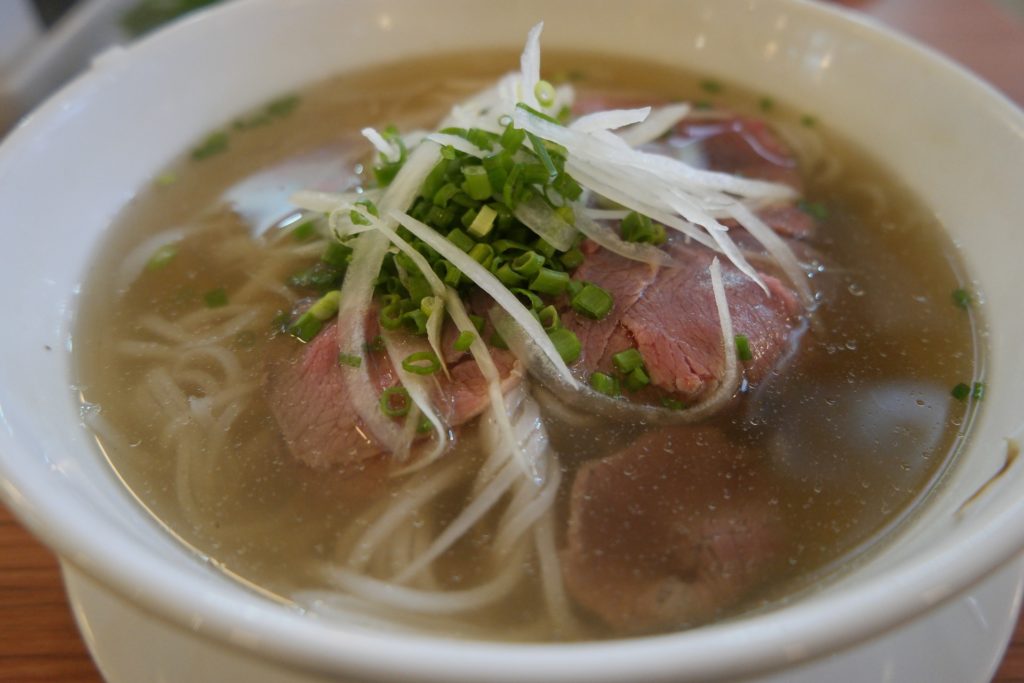
Beef Soup – Rindsuppe
It is a clear, slightly greasy broth of golden-brown colour, cooked on beef meat, served with noodles and pieces of sliced root vegetables.
2.4. Gulasch – Meat Stew

Goulash – in Austria spelled Gulasch – a heavy beef stew
The origin of this dish is Hungarian, but it was popularized during the times of the Austro-Hungarian empire also in Vienna and around the country. It is a heavy stew. In Austria it is traditionally made of lean beef seasoned with paprika and cooked with onions and sometimes other vegetables. In Austria it is often served with bread dumplings.
2.5. Game
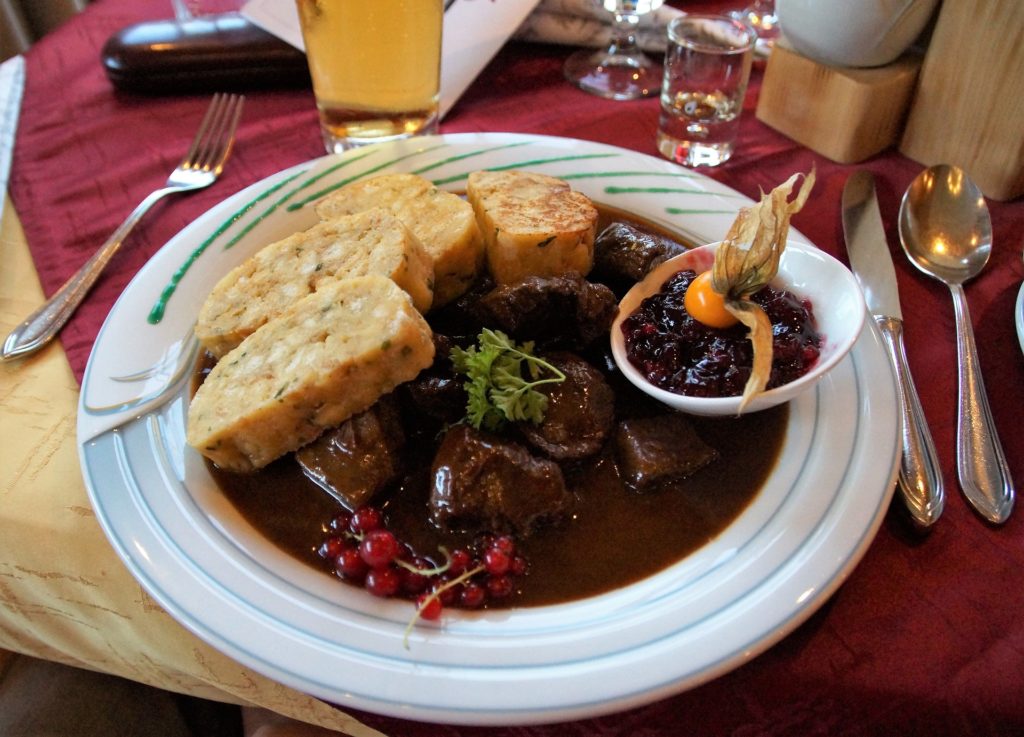
Deer stew – one of classic Austrian game dishes
One of the specialties of Austrian cuisine that you find in this country much more often than in most others, are game dishes. With centuries-long hunting traditions, and many forest and mountainous areas, Austrians have an impressive range of game animal dishes to put on the table.
What are the classic Austrian game animal dishes?
- Hirsch – deer / venison
- Wildschwein – wild boar
- Feldhase – hare
- Rebhuhn – partridge
- Fasan – pheasant
3. Typical Austrian Desserts & Sweets
That is the part of the Austrian cuisine I recommend you most! Austrian desserts and cakes are heavenly tasty, and they will make you want to order more and more. Try all of them!
3.1 Apfelstrudel – Apple Strudel
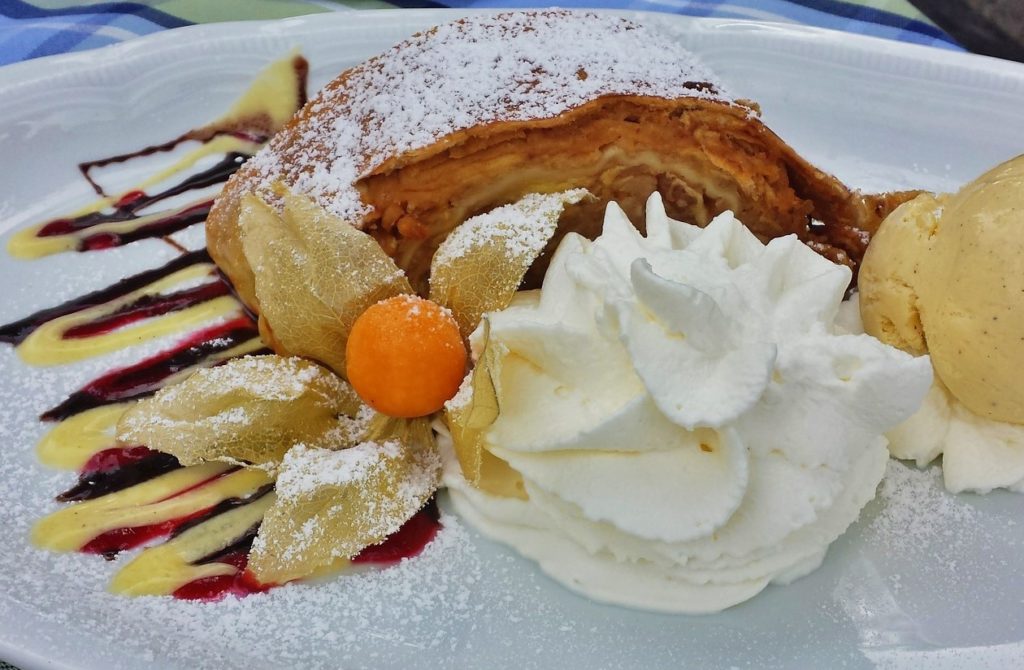
Austrian Apfelstrudel – probably the most famous type of apple pie in the world
Strudel is a world-famous delicate cake made of many layers of thin pastry and small slices of apples mixed with raisins, walnuts and cinnamon. It is usually served with a scoop of ice cream and/or whipped cream. It’s a must-try when you visit Austria!
3.2 Other Types of Strudels
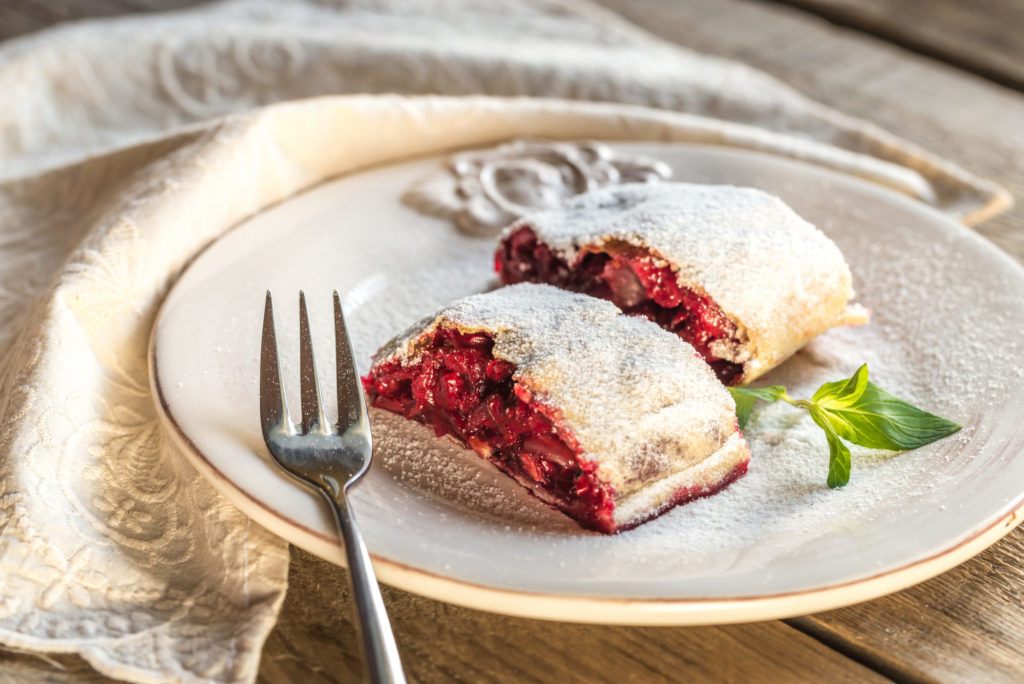
Weichselstrudel – Sour cherry strudel
All Austrian strudels are worth trying! Don’t be shy! ;) There are at least three other delicious classics wating to be tasted by you. And really, strudels are among the most typical Austrian foods!
What are the types of Austrian Strudel?
- Topfenstrudel – filled with typical local curd cheese called Topfen prepared with vanilla and sugar.
- Mohnstrudel – filled with poppy seed mass, a dessert with origins from Poland.
- Weichselstrudel – sour cherry strudel.
Check out Austrian street food and sweets to try in the Christmas period:
Christmas Markets in Vienna – Austria – All You Need To Know
3.3. Sachertorte
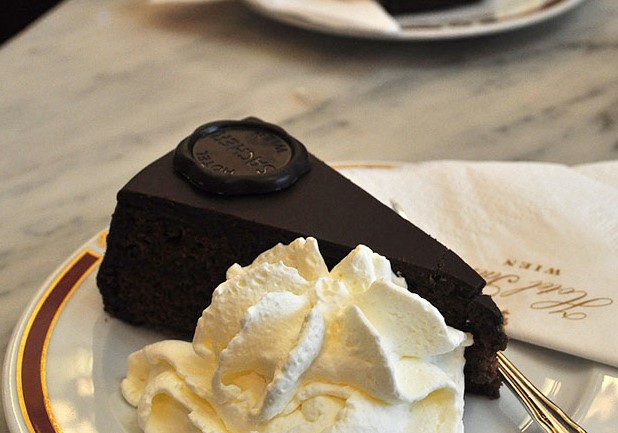
Famous Viennese Sachertorte
This classic of the Viennese cafés is a rich, intense chocolate cake with thin layers of apricot jam, always served with whipped cream.
3.4. Punschkrapfen
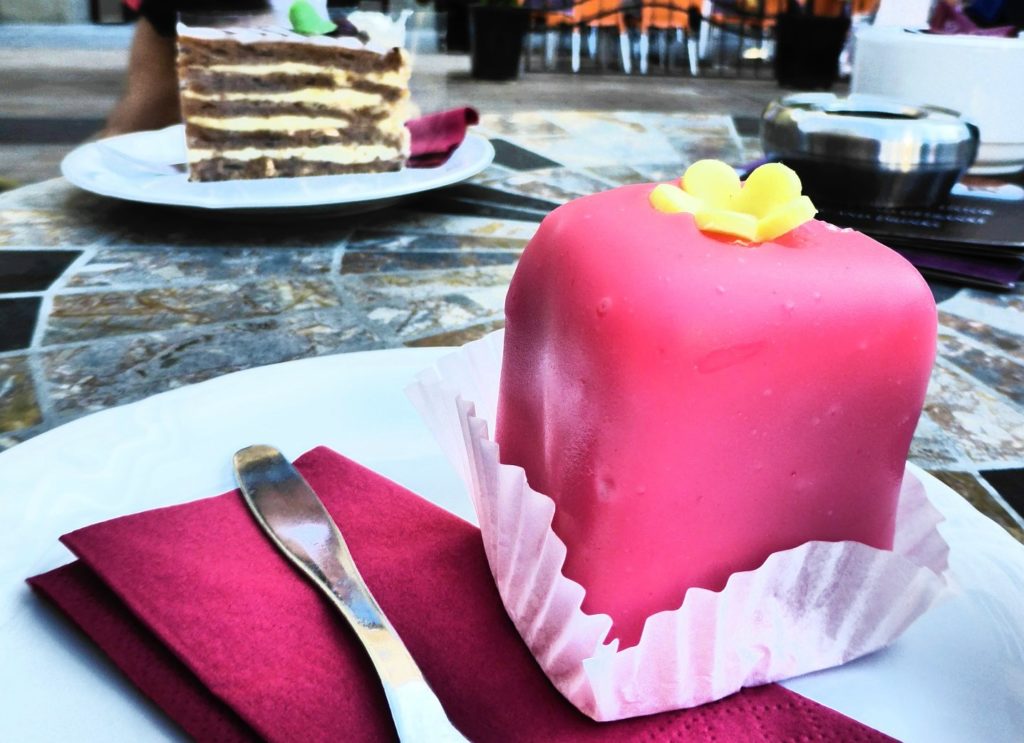
Attractively pink glazed Punschkrapfen are a classical Austrian dessert
These typical Austrian square-shaped, pink-glazed cakes are filled with nougat and apricot jam and soaked with rum, which gives them a unique and intense taste and a lovely aroma.
3.5. Topfenkolatsch & Other Viennoiserie
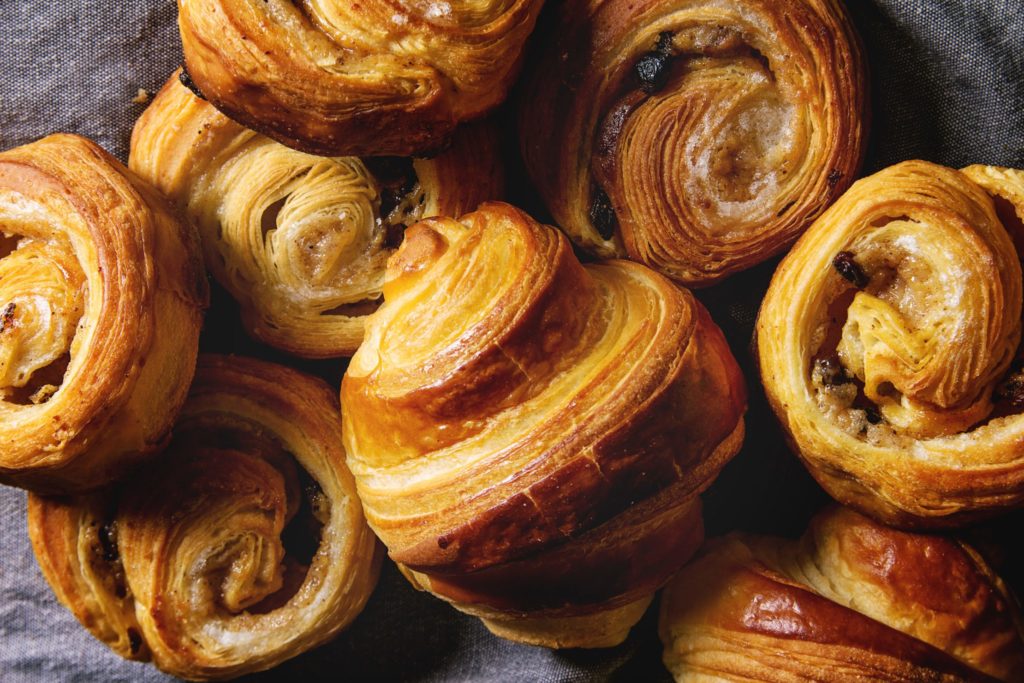
Puff pastry is an actually an Austrian invention – also known as Viennoiserie
Viennoiserie, literally meaning “things from Vienna”, is a category of pastries made of sweet yeast dough or puff pastry, often laminated by butter. The most typical and internationally known examples include croissant, brioche, pain au chocolat etc. that you probably thought were French. Nowadays this kind of sweet buns are often called “Danish pastry” or “French pastry”, but their origin definitely comes from Vienna, and they were later popularized in other countries by Austrian bakers.
One of the local classics of such pastries is Topfenkolatsch – square “envelope” with sweet cheese & raisins filling.
3.6. Salzburger Nockerl
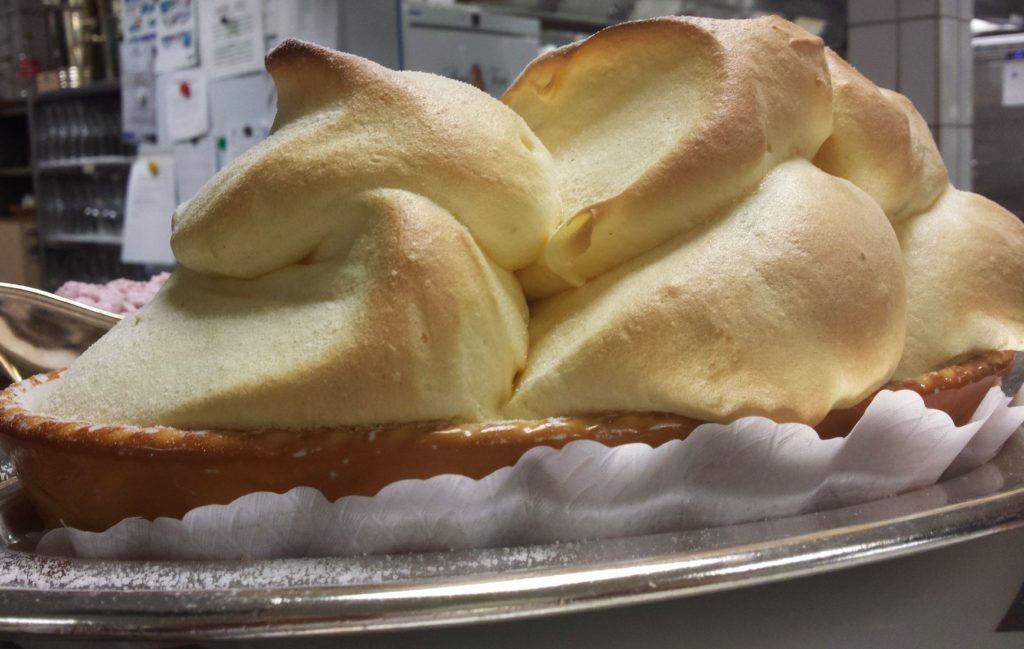
Giant meringue-type cake – Salzburger Nockerl
This elegant and sophisticated dessert, originally from Salzburg in Austria, is a very particularly kind of a sweet soufflé. It is a type of meringue, baked until it gets golden. It is very airy and light, and it is served in an unsual way as a rather big cake to cut into pieces.
3.7. Mozartkugeln – Nougat Chocolate Bonbons
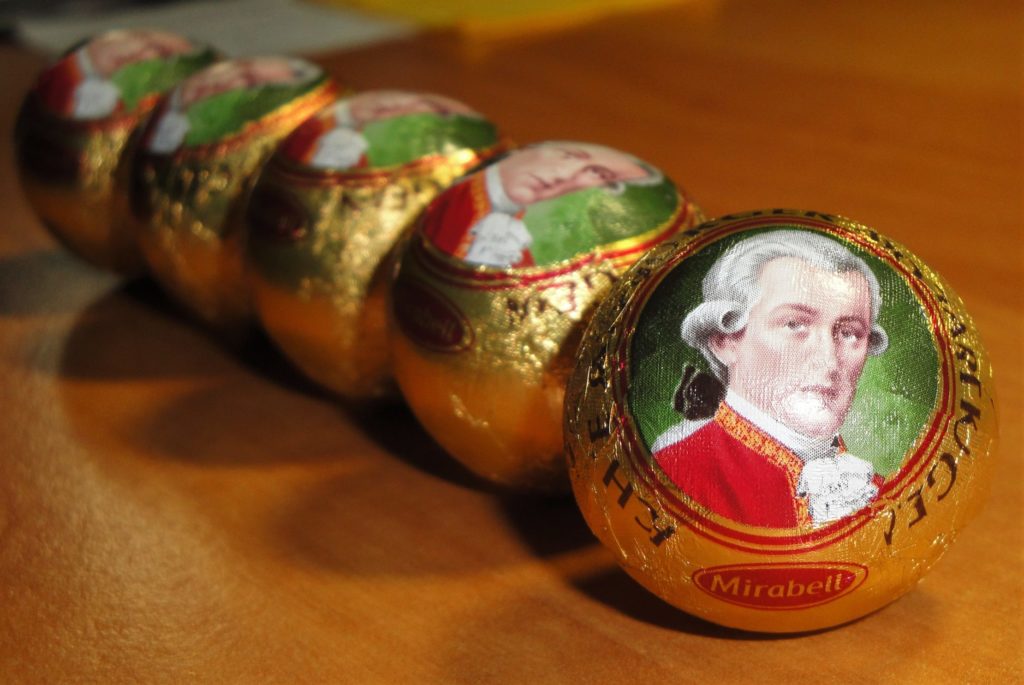
Mozartkugeln bonbons. Photo by Yike G under license CC BY-SA 3.0
It’s impossible to write about the Austrian sweets omitting one of the most delicious inventions of this country: Mozartkugeln! These are balls of pistachio marzipan and nougat covered with chocolate.
4. Typical Austrian Drinks
4.1. Austrian Coffee Culture
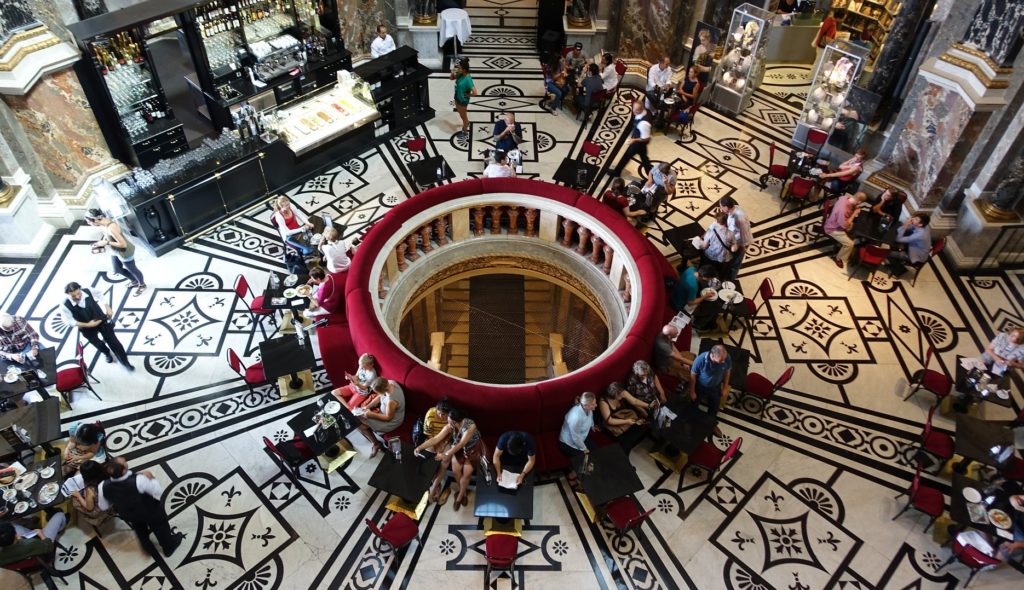
One of many elegant and classy cafés in Vienna – at Kunstmuseum
Vienna is considered the European coffee capital. Not only have the Austrians introduced coffee, obtained from Turks, to Europe – they also have developed some of the world’s earliest coffeehouses in the form that we know nowadays.
Moreover, no other country preserved such exquisitely elegant, charmingly old-fashioned and sophisticated culture of serving – or rather celebrating – coffee. Viennese café tradition has shaped the Austrian capital’s identity. It has been a model and point of reference of the style and elegance in the neighbouring countries and all the countries once belonging to the Austro-Hungarian Empire.
What are the types of Viennese coffee?
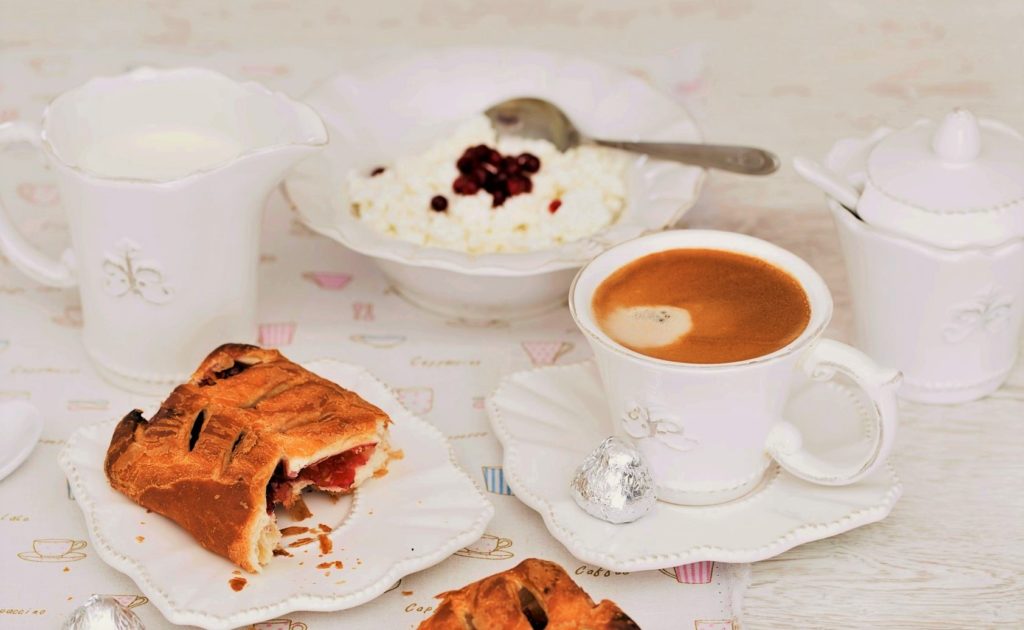
In classy Viennese cafés coffee is traditionally served in subtle china sets
- Kapuziner – Viennese classic: espresso with generous portion of whipped cream.
- Melange – classic Viennese coffee similar to cappuccino – topped with foamed milk.
- Franziskaner – Melange with whipped cream.
- Mokka – comparable to espresso.
- Großer Schwarzer – a double Mokka.
- Wiener Eiskaffee – iced Mokka topped with vanilla ice cream and whipped cream.
4.2. Viennese Hot Chocolate
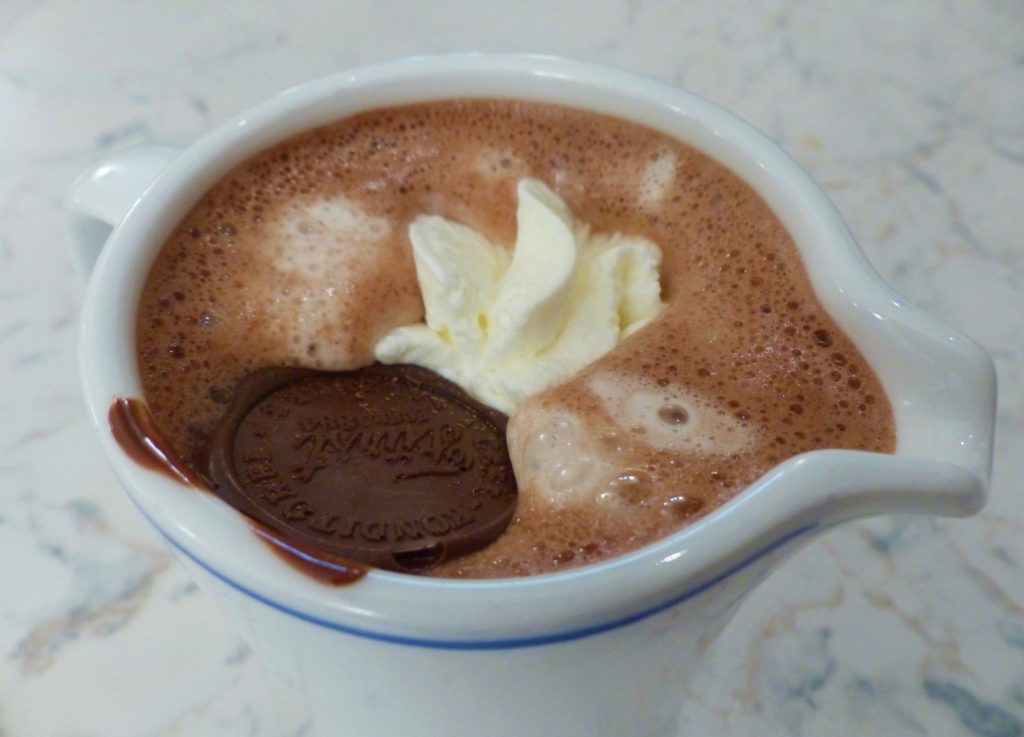
Rich Viennese hot chocolate
One of the best hot chocolates that exist! Viennese chocolate is very rich, thick and intensely aromatic, usually topped with whipped cream. Delicious!
4.3. Austrian Alcoholic Drinks

Shots of Inländer Rum Stroh
Which are the typical alcoholic beverages in Austria?
- Inländer Rum – it is a traditional “rum substitute” produced in a different process than real rum, but with a mixture of characteristic spices that give it a particular aroma and flavour. Try Stroh brand.
- Marillenschnaps / Marillenbrand – apricot brandy.
- Obstler – brandy from other fruits, like plum.
4.4. Austrian Wines
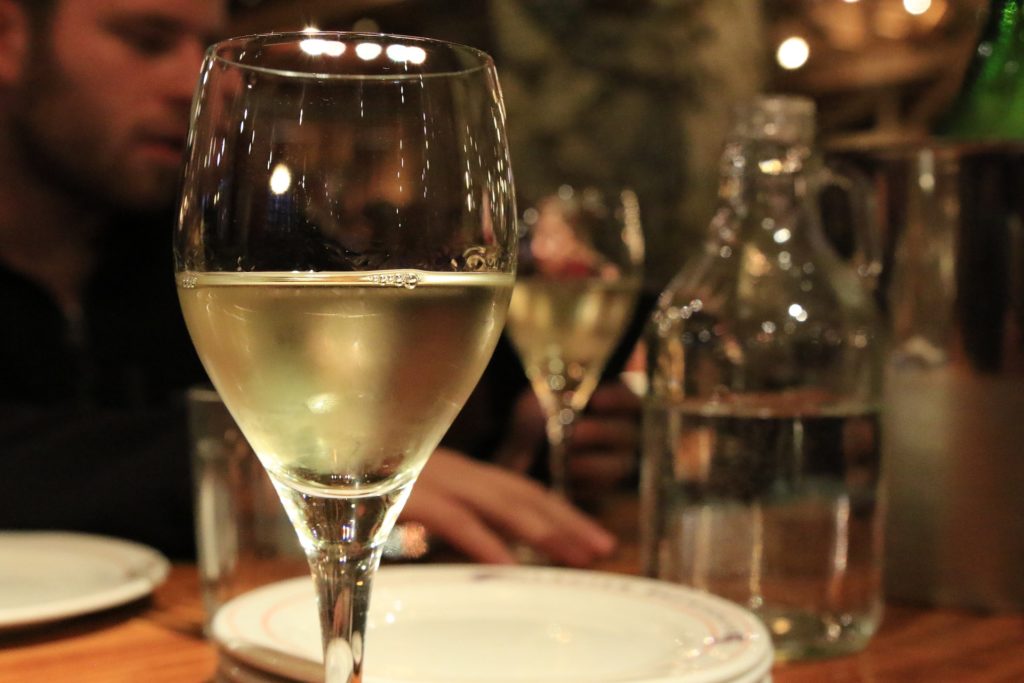
Austrian wines are considered of unique taste and are highly valued
Austria produces small quantity of wine, but of high quality and rich variety.
- Riesling – the most famous Austrian wine, white and usually dry, refreshing, with a perfumed aroma and high acidity.
- Grüner Veltliner – the other renowned Austrian dry white wine, with quite low alcohol content, slightly acidic and with aftertaste of green fruits.
- Blaufränkisch – a highly appreciated red wine with red fruit and peppery spice aroma, of moderate acidity.
4.5. Austrian Beers
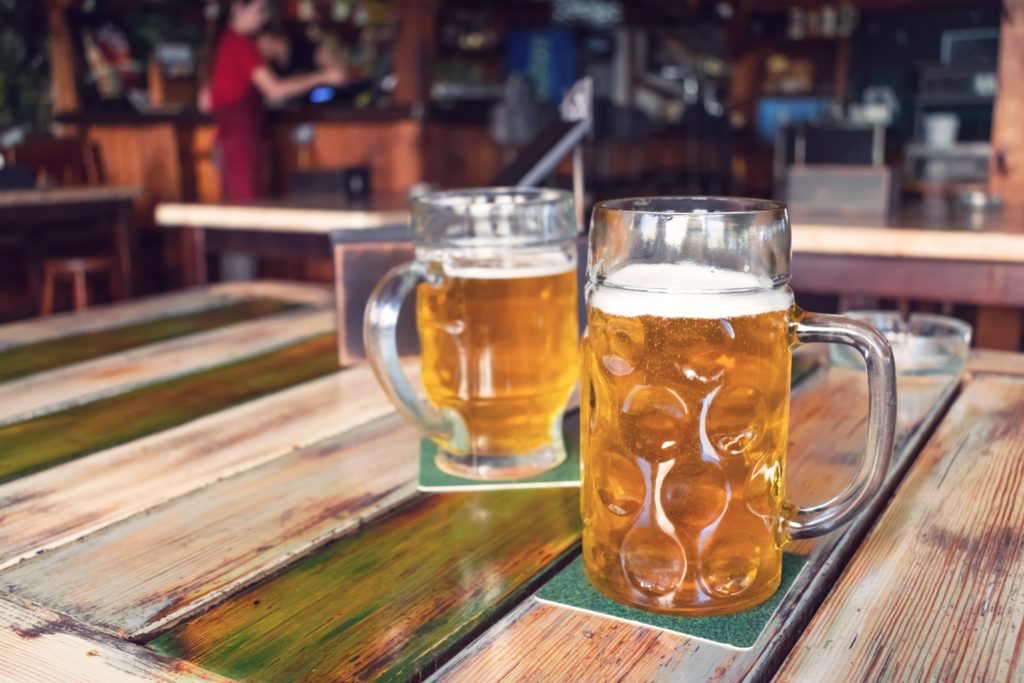
Most popular Austrian beers are pale lagers
What are the typical Austrian beers?
- Märzen – pale lager. Brands to try: Murauer Märzen,
- Zwicklbier – cloudy, full-bodied blonde. Brands to try: Kellerbrauerei Ried Naturtrüb, Privatbrauerei Trojan Schrems Schremser Roggen Bier
- Weissbier – wheat beer. Brands to try: Fohrenburger Premium Weizen, Salzburg Weissbrauerei Hell Die Weisse.
Typical Austrian beers are usually of pale lager type; dark beers are less popular.
FAQ About Typical Austrian Food
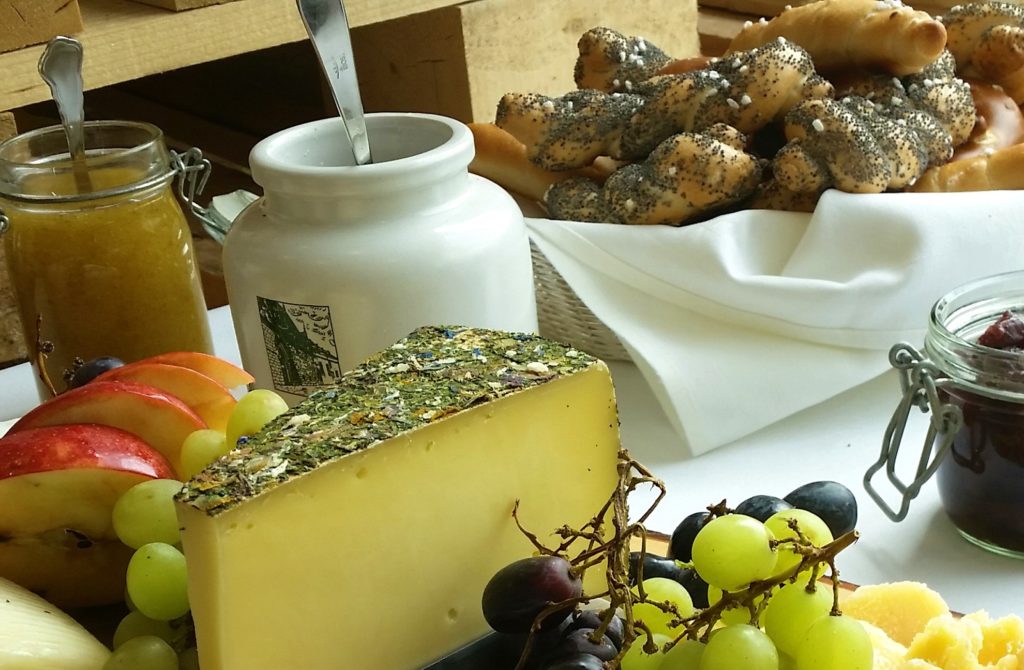
Fresh bread rolls, marmalades and cheeses – Austrian breakfast in a guesthouse
1. What is the national dish of Austria?
The most typical Austrian dish is definitely Wiener Schnitzel.
2. What is the typical Austrian breakfast?
Austrians eat a typical “continental” breakfast. More precisely: wheat bread rolls or Schwarzbrot – a very dark brown rye bread (delicious), with butter and marmalade (usually of apricot). Or bread / bread rolls with slice of cold meats and cheese. Sometimes also pastries like Topfenkolatsch are eaten for breakfast. Breakfast drinks are typical: coffee, tea or juice.
Other Typical Austrian Food
Do you know any other typical Austrian dishes to add to the list? Do you have questions or comments? Write them below! And share the post!
4 thoughts on “Typical Austrian Food – 20 Traditional Dishes & Desserts”
Leave a Reply
More Travels in Europe

Which Are The Best Christmas Markets in Europe (2023)?

The Best Cities in Europe for New Year’s Eve – Unique & Exciting!

Shopping in Berlin – Souvenirs, Typical and Cheap Gifts

10 Reasons Why Visit Amsterdam and Keep on Coming Back

11 Reasons to Visit Zaragoza, Spain – The City of Four Cultures
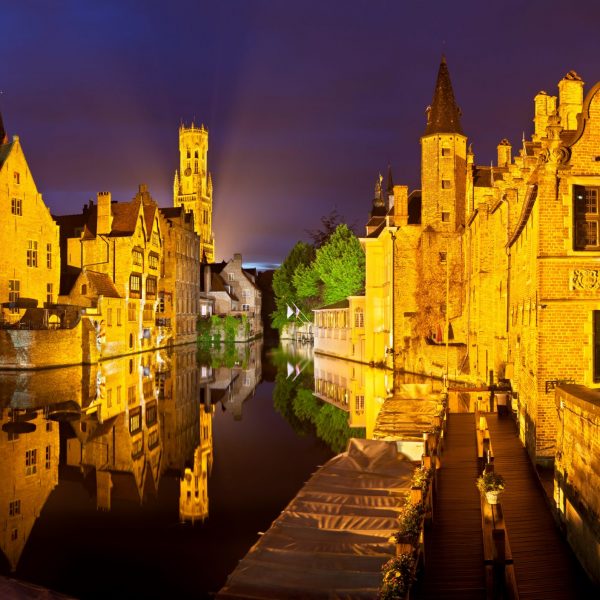

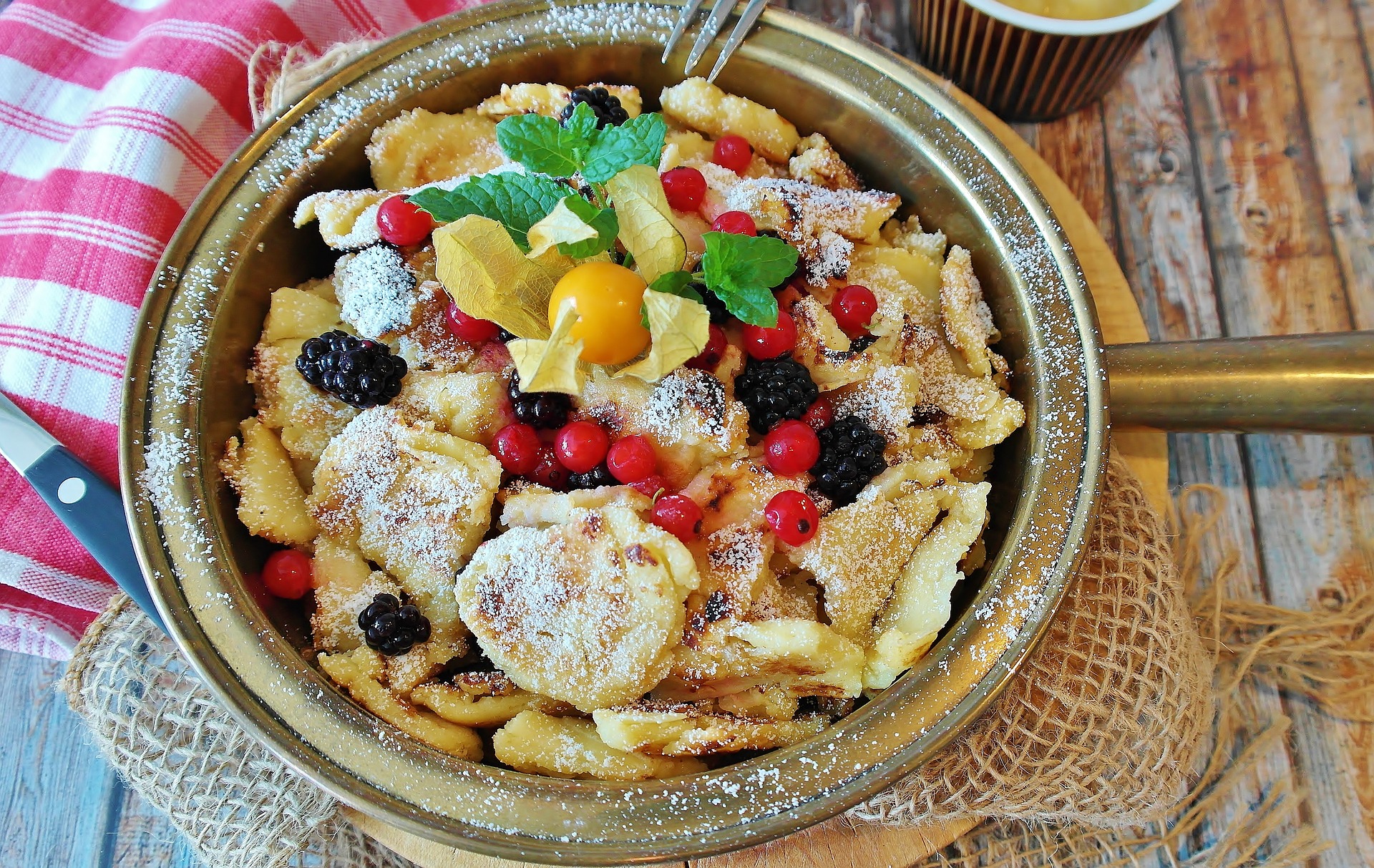
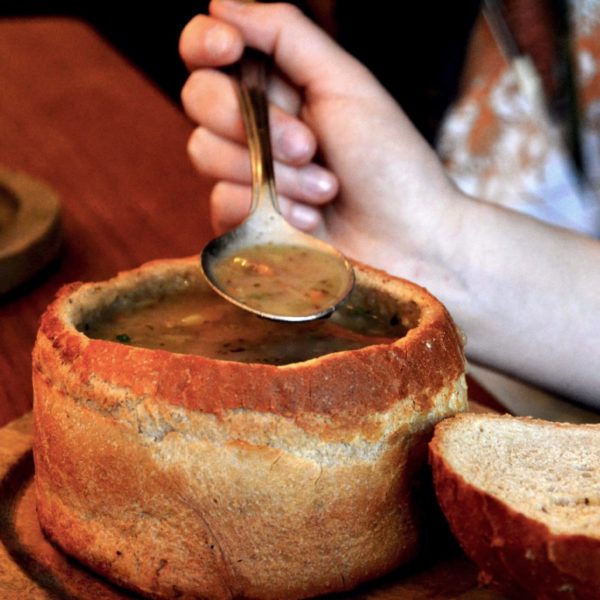
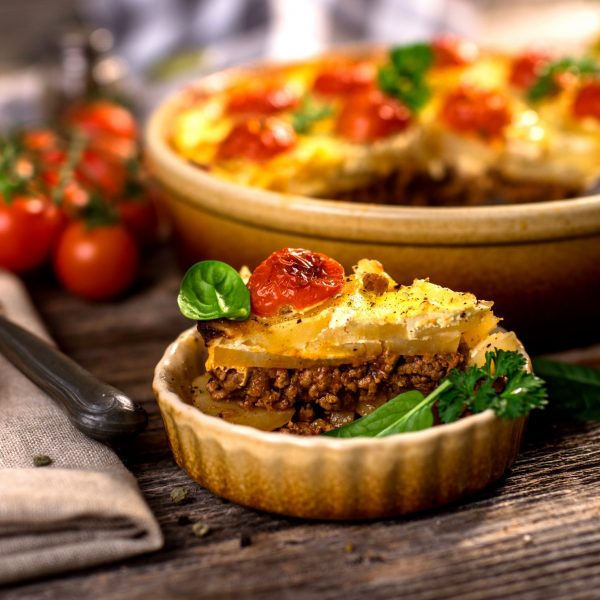
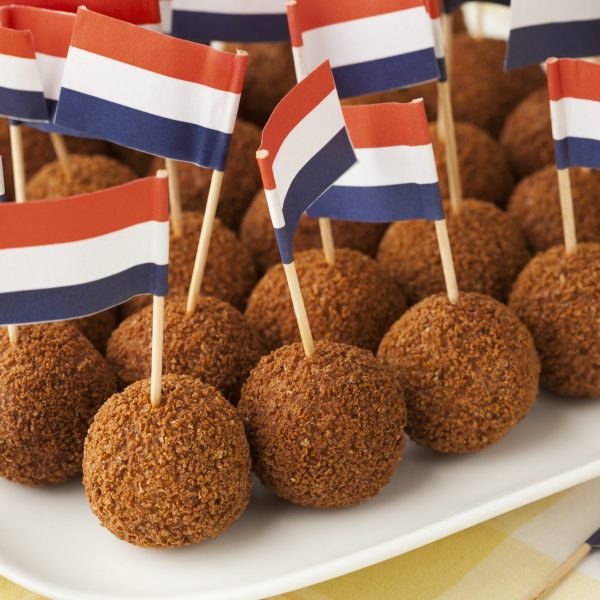


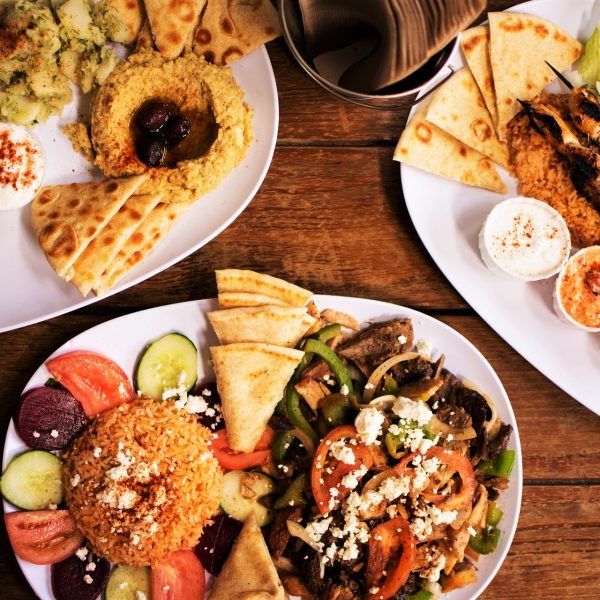
I like this post, enjoyed this one appreciate it for putting up.
Nice article post, now I know more on Austrian foods, they are not so well known. Much thanks.
Thanks for the blog. The food post is very nice. I will read more.
All those dumplings and noodles are delicious. I’m vegetarian so I really appreciate your division between veg dishes and meaty ones, usually associated with Austria.